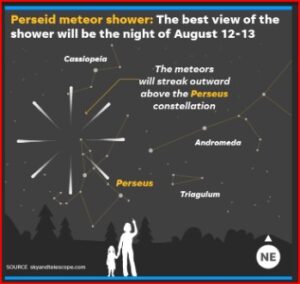🔗 NASA: Perseids Peak Info
🔗 LiveScience: Stargazing Events
🔗 Light Pollution Map
🔗 International Dark Sky Places

What Makes the Perseids So Special?
The Perseids are famed for their speed and brilliance, with meteors traveling at 37 miles per second (60 km/s). They’re the remnants of Comet 109P/Swift-Tuttle, and when these particles hit Earth’s atmosphere, they vaporize and release bright streaks of light.
Even under suboptimal conditions, a handful of shooting stars will still be visible—especially if you go stargazing in a dark, rural location and let your eyes adjust to the night.
“While conditions in 2025 are far from perfect, if you go stargazing when the moon is down — and even when it’s up — you’ll probably notice one or two of the year’s most famous shooting stars,” notes NASA.
Camp Mystic Tragedy: Texas Flood Search Continues as Dozens Remain Missing
Pro Tips for Stargazers
- Check moonrise times in your local area using tools like TimeandDate.com.
- Find a dark sky area using the light pollution map.
- Allow at least 20–30 minutes for your eyes to adjust to the dark.
- Look away from the moon and give yourself at least an hour to watch.
Despite interference from the Sturgeon Moon, the Perseid Meteor Shower remains a spectacle worth watching.


